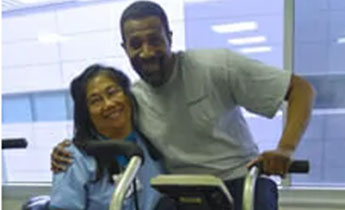Lance Lewis was cheering at his son’s basketball game three years ago when suddenly, he collapsed. A massive heart attack had taken control of his body.

He then spent three long, challenging months after his heart attack exercising in Weiss Memorial Hospital’s Cardiac Rehabilitation gym. Physical activity was a major component of Lance’s recovery after paramedics shocked his heart 20 times in the minutes following his collapse.
He was relatively young when the incident happened. At 53 years old, he was lucky to survive, and recovered first in the Intensive Care Unit (ICU) at another hospital. Then the hard work began.
Lance had to make major lifestyle changes such as eating right, avoiding alcohol, and exercising.
“I thought I was too young for Cardiac Rehab. The first time I walked in, they were playing ’50s music, and it was all older people,” he says.
For 36 workout sessions over three months, he walked the treadmill and rode the stationary bike while Weiss Cardiac Rehab nurses monitored his blood pressure and heart rate, watching him for signs of complications.
Cardiac Rehab Nurse Virgie Palella, RN, says Lance excelled in recovery. “He followed everything to a T,” she says.
Three years later, Lance continues to spend his weeks in Cardiac Rehab at Weiss. He works out for two hours three times a week on the hospital’s sixth floor.
“I come to Weiss as my gym,” the Edgewater resident says. “There are times when I don’t feel like coming. When I first get on a machine, I don’t want to be there. But once I leave, feel a lot better.”
An Unexpected Incident
Lance refers to his heart attack as a “wake-up call” for not only himself and his family, but also for African American men overall.
“African American men tend to look good on the outside, but we’re being destroyed on the inside from things like hypertension, smoking, alcohol consumption, and diabetes,” Lance says. “Once you hit 50, everything you’ve done in the past decades starts accumulating.”
He remembers the exact date of his heart attack: January 23. He had retired recently from a high-stress job in the Chicago mayor’s office.
Lance’s son was shaken when his father fell to the gym floor, but tried not to show his fear as the paramedics shocked Lance repeatedly with a defibrillator. The medical team’s efforts paid off, but Lance had a long recovery ahead.
He found motivation in his son. Lance’s own father had died in a tragic accident when Lance was 13, and at the time of Lance’s heart attack, his son was also 13.
“I was determined not to leave him like my father left me. I want to make sure I’m there for him,” he says, adding that now his son looks out for him. “We’re so close that when we’d hang out, I’d eat what he’d eat—a lot of fast food. Now he eats what I eat: lots of water, no red meat.”
Lance learned to change his diet with the help of Palella and through free educational seminars offered at Weiss. He consumed as much information as he could, cutting out sugar, avoiding food late at night, limiting alcohol, and adding in lots of fruits and vegetables.
“The information is out there, but we live in a microwave society—quick, fast. Your health has to be a mission. You have to be a student and work at it. There’s no excuse,” Lance says.
He sees modern life as a double-edged sword. “We have all these health clubs and medications, but people get sicker at younger ages. There are excesses of medicine but also excesses of things that can hurt you,” he explains. “It’s up to you to manipulate the system to make it work for you. Some people may not have the self-discipline to navigate it or the education, but you have to be a student. I found that out the hard way.”
Palella says education plays a huge role in cardiac patient recovery. “I want them to have the knowledge to make lifestyle changes and keep stress low. Now Lance doesn’t put himself in situations that aren’t good for him,” she says.
A New Support System
When Lance first started coming to Weiss’ Cardiac Rehab gym, he says he questioned what he was doing. “You only go to a hospital if you have to, and men especially don’t like going to the doctor. Now, I look forward to coming here and working out. I had no choice but to embrace it. After all, I could be in worse places.”
Palella says that Lance wanted to stay because “he felt it was safest for him. He met friends and had a camaraderie with people who’d been through similar experiences.”
Lance adds that along with other regular exercise participants, the staff have become like family to him.
Palella sees the experience as something in which cardiac patients can believe. “They have people they can talk to. They’re exercising their physical self and their emotional self.”
Lance laughs, “Even if I miss one day, they call me the next day to make sure I’m ok. They make me feel like I can push myself and not worry.”
Focus on the Future
During the three months of his recovery and in the three years since, Lance has had time to reset his life and focus on what’s important to him.
“I think I’m back. I’ll never be back to where I was totally, but my heart rate is good, and my blood pressure is down,” he says. “It’s hard to get to that spot, but it’s easy to fall back. I miss the ribs, red meat, sugar. There’s a lot of self-sacrifice that goes into being well.”
Now, Lance focuses on keeping stress out of his life, which he says is increasingly difficult since he turned 50, when he was stressed and didn’t realize it. Retirement had hit him in surprising ways, going from the pressure of his job to worrying about managing money, being a good father, and having a seemingly uncertain future.
He still worries from time to time, but says exercise has helped give him a sense of purpose.
“Exercise is the best medicine. It will prolong your life. It’s not going to happen overnight, but stick with it,” Lance says.
For cardiac patients specifically, he advises, “Follow your doctor’s instructions. Embrace your recovery. Set a goal. You will reach it.”
Learn more about the Cardiac Rehab Department at Weiss, or call (773) 564-5898 with questions.
